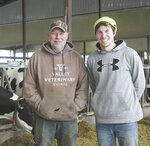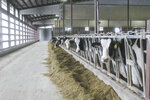

How did you get into farming? I was raised being around the farm. I never felt pressured to be a part of the farm, and it was something I was able to choose to be a part of. I have always enjoyed working with the cows. I watched both my grandpa and my dad, who are great cowmen. I became intrigued by genetics at a young age, looking at bull books, and I found something that interested me.
What are the most significant ways your farm has changed since you started farming? The implementation of technology, particularly the robots, is one of the biggest things along with the activity and rumination monitors. I love our sort gates. They route our cows out of the robot if there is a cow we need to work with, without disturbing the pen. Keeping the peace in the free stalls is important to us, and that was something that appealed to us about installing robots. Another big thing is how much my dad, my brother and I all care about doing things right. We are at a good size for us to manage, and we have one full-time employee, Kyle. We are all involved in the day-to-day management. My dad is one of the best cow people I know, and I am learning those skills from him. Thanks to all the data, we can use that information as we are walking the pens. Technology is never going to stop, and there is enough data now behind all of the technology that it is successful.
What was a challenge you faced in your dairy farming career and how did you overcome it? The greatest challenge was going from a 69-stall tiestall barn into a new barn, milking 250 cows with four robots. Our farm started in 1977 with a 23-stall barn, growing to a 46-stall barn in the mid-1980s. That was the last expansion before the move to robots in 2015. We lost some acreage, so getting back to a better balance and doing a better job with our cropland was the next biggest challenge. We use more conservation practices to better care for our land, doing things like reducing tillage as much as possible, avoiding compaction, and being more intentional about our rotations and our manure application. We started using more cover crops because they could provide us with six to eight months’ worth of heifer feed. We began working with an agronomist, which helped us work through those challenges. My brother is as passionate about the fields and crops as I am about the cows, and that helps provide balance in our farm.
What is the best decision you have made on your farm? The robots were a great decision for us. It took a bit of time to learn how to maintain and repair the robots, and the costs associated with that were higher than what we had expected. Moving into the robots was a stressful time. We were having to learn the system as much as the cows were having to learn the system, and now we are more proactive in terms of maintenance, which decreases those costs. Aside from that, we have done a great job learning how to not only manage the robots but manage the cows on the robots. Our cows are healthier than they were before, and we are averaging about a 78,000 somatic cell count.
What are three things on the farm that you cannot live without? My family is super important. That is the luxury in agriculture. Your family means so much more to you, and you learn what is important. You are all on the same team, working together, striving for the same goal. Second would be technology, because it makes your life so much easier. It allows me to develop a plan when I come in the morning, and it gives my day direction. I know what needs to be done, and I can start checking things off the list. Robots also make us more flexible because they free up such a substantial amount of time that milking would take. Third would be the people around us: our landlords, our employee and the farmers around us that we work with. We couldn’t farm without any of them. They want us to succeed, and we want them all to succeed.
What are your thoughts and concerns about the dairy industry for the next year? Interest rates are a big deal, but we aren’t looking to expand. The cow and heifer numbers are concerning. Cow numbers are lower than they think they are. We raise more heifers than we need, and we sell a lot of cows. We are making it work for us. Those extra heifers are not a liability for us. They are an asset and provide an income stream. We are fairly self-sufficient. We have the heifers we need, we grow out and sell feeders, and we combine our own corn. I am not scared of what this next year is going to bring in terms of markets. I would like to see exports grow and the local economy staying healthy to keep moving product. I am more concerned about the global pressures and the idea of the country shutting down again in addition to limiting what people can and cannot do. They have done that once. Our economy cannot do it again. What we experienced through that was literally the most unique situation — signs in the grocery store limiting consumers to 2 gallons of milk at a time while farmers were dumping milk.
What strategies do you use to withstand the volatile milk prices? We use Dairy Margin Coverage program because it is fairly inexpensive and paid well last year. We are not using Dairy Revenue Protection, but we did use it right before the pandemic. It can be a great tool, but I am not sure it always makes sense for us. The real problem is why should we have to insure our income? What other occupation has to do that? We don’t live in a communist country, but we work in a dictatorship where we have no say in our income. When you have a job interview, before you accept a job, you discuss your wage and salary requirements. Why are we told, with no input, what the value of the product we produce is?
How do you retain a good working relationship with your employees? It all comes down to respect and placing value on people. Working together and keeping your cool, regardless of the situation, and always remembering the people are more important than whatever the problem might be. It is extremely important to give back to your community by being involved and giving of your time, not only to grow and improve your reputation and the farm’s reputation within the community but to build relationships within the community. What people care about is seeing you give of your time, making that personal connection. I coach wrestling and am able to give my time to kids. The relationships that I have been able to build through that impact our farm, when it comes to hiring employees. Our employee was one of my wrestlers, and I have high school kids asking me about jobs frequently. By giving them my time, they develop a respect not only for me but for my work at the farm as well. It is important for us as dairy farmers to get out of our circle and involve ourselves in things outside of agriculture and the dairy industry.
What do you find most rewarding about dairy farming? What you put into it, you get back. If you are working hard, educating yourself to the highest level and putting a lot into it, you will get rewarded. Dairy farming maybe isn’t for everybody, but it is for every person who wants to reap the benefits of their own hard work. In college, I worked at a cast iron factory and hated it. At the farm, I am the driver. I can take it anywhere I want, making it blossom, or I could run it into the ground in two months. But, I am the one making those decisions, putting that effort in. Working as a team with my family is so important. This is what we have chosen for our careers.
Tell us something special about your farm. We are just a family business with my dad, my brother and I all working together. The robots aren’t as unique as they were 10 years ago. Our focus on genetics is important to us. The quality of our milk is important to us. We average a 4.5% fat test and 78,000 SCC. We are doing things correct. We have a low cull rate. We have healthy animals, and we don’t need to cull heavily. It is hard to be faced with the prospect of having to cull a cow only because she is getting older and isn’t milking at her peak. We are actually looking at building a retirement pasture and pen to keep those old girls around who have done their jobs well and done everything we have asked of them. It has become important to us, and it plays back to that respect factor.
What are your plans for your dairy in the next year and five years? For the next year, we are planning to pay down any debt we have. We aren’t planning on buying anything new right now due to interest rates. We plan to keep working toward our sustainable goals and will be using variable rate fertilizer spreading. We would like to put in a new feed pad this year. We would like to be able to have the option to buy feedstuffs in bulk. For the next five years, the question is to expand or not to expand. I am young enough to expand, we have a good number of heifers, and we have a good carryover of crops. We could probably milk more cows, but we need to decide if we want to or if we need to. We know it would make us more efficient, but we don’t want to lose quality for gaining efficiency. Quality and doing things the right way is important to us. We were raised to take care of what we have and do the best we can with that.
How do you or your family like to spend time when you are not doing chores? We enjoy spending time with family and friends, kicking back and relaxing a little, and we love watching Packer games. I enjoy wrestling and coaching and building that circle of friends and community involvement.
Comments
No comments on this item Please log in to comment by clicking here